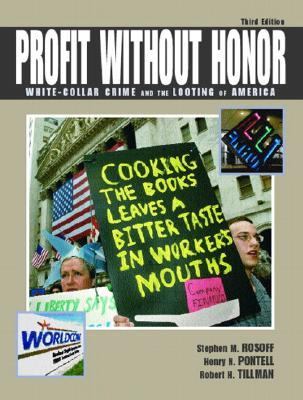202069
9780131148741
Profit Without Honor White-Collar Crime and the Looting of America
by Rosoff, Stephen M., Pontell, Henry N., Tillman, Robert H.
About this item
- Condition: Acceptable
- Provider: Read A Book Contact
- Provider Rating: 81%
- Ships From: Multiple Locations
- Shipping: Standard
- Comments: IMP: Acceptable- Do not include ACCESS CODE, CD-ROM or companion materials even if stated in item title. It may contain highlighting/markings throughout, and the covers and corners may show shelf wear. Corners, pages may be dent. All text is legible. 27

Product details
- ISBN-13: 9780131148741
- ISBN: 0131148745
- Edition: 3
- Publication Date: 2003
- Publisher: Prentice Hall PTR
AUTHOR
SUMMARY
In the short time that has passed since the second edition of this book was published, there have been significant new developments in the study of white-collar crime. One would surely expect such a development, since the battle between profit and honor is as old as human commerce. What even the authors of this book did not expect was the sheer magnitude and pervasiveness of the recent corporate scandals. When Enron tipped over the first domino, it loosed a shocking fission of corporate failures and revealed a deep vein of sociopathic greed that most Americans could scarcely believe. Trust in the economy eroded to levels not witnessed since the Great Depression. Hard-working employees saw their lives shattered by fraud and mismanagement. Investors watched helplessly as life savings were destroyed. Captains of industry, who had long seemingly been above the law, modeled handcuffs while doing so-called "perp walks" on the evening news. When the second edition ofProfit Without Honorwent to press, companies like Enron, WorldCom, Global Crossing, Qwest Communications, Adelphia, Rite-Aid, ImClone, and Arthur Andersen looked like pictures of robust financial health. Now, many of these companies are dead, and others are clinging to life support. Congress has passed the toughest corporate governance law ever enacted, and the once-sycophantic financial press has turned ferocious. Computer crime has continued to emerge as the nation's fastest-growing category of crime. Two recent cyber-attacks have brought the Internet to its knees. One attack damaged an estimated 45 million PCs; the other crippled most of the major e-commerce sites. And each attack was launched by a15-year-old boy."Pump and dump" schemes have exploded on the Internet. And "identity theft" has become part of the popular lexicon. Perhaps the most ominous trend is that organized crime has smelled the "new economy" and has forced its way to the feeding trough. Earlier editions of this book described Wall Street brokers as acting like organized criminals. This edition depicts organized criminals acting like Wall Street brokers. One of the biggest and most important antitrust cases in American history--U.S. v. Microsoft--has been settled amid much controversy. And the most publicized insider trading case since the 1980s has ensnared one of the most famous and successful women in corporate America--Martha Stewart. All of these cases and many others are considered in this updated edition. So, once again,Profit Without Honorseeks to elucidate a very broad subject that seems only to get broader: white-collar crime. How broad? Its domain stretches from the small, price-gouging merchant to the huge, price-fixing cartel. White-collar crime can breed in an antiseptic hospital or a toxic dump. It is at home on Main Street, Wall Street, Madison Avenue--sometimes even 1600 Pennsylvania Avenue. Yet, as Americans demonize the Crips and the Bloods, recoil at Osama bin Laden, and continue to obsess over O. J. Simpson, white-collar crime still remains the "other" crime problem. The reason for this relative indifference is that the true costs of upper-world misconduct are largely unrecognized. Compared with murderers, terrorists, and urban gangsters, white-collar criminals do not seem to scare the public very much. Even the economic expense--by far the most identifiable cost--is typically underestimated by the average citizen. Annual losses from white-collar crime are probably 50 times as great as the losses from ordinary property crime. For example, the price of bailing out a single corrupt savings-and-loan institution surpassed the total losses of all the bank robberies in American history. The bill for the entire S&L bailout ultimately may exceed atrilliondollars. (To put that figure in perspective, consider that a million seconds is about 11 days; a trilRosoff, Stephen M. is the author of 'Profit Without Honor White-Collar Crime and the Looting of America', published 2003 under ISBN 9780131148741 and ISBN 0131148745.
[read more]


